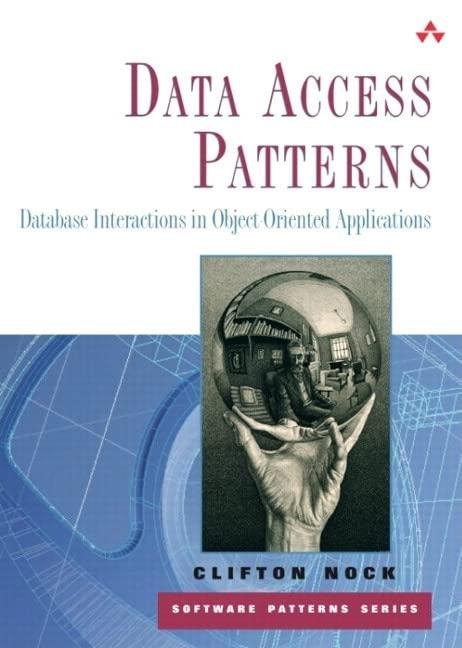Question
Use python 3 Problem: In this exercise, you will compare the runtime of dequeue() method in Bounded Queue and Circular Queue. In bounded queue, once
Use python 3
Problem: In this exercise, you will compare the runtime of dequeue() method in Bounded Queue and Circular Queue. In bounded queue, once you dequeue an item, the remaining items in the list will be shifted left. But in circular queue, you just change the start pointer (index) when dequeue. So in theory, dequeue in circular queue should be much faster than that in bounded queue. Write your code to justify whether this hypothesis is true or false.
Here are the steps for this experiment: 1. Create two queues, one bounded queue and one circular queue. 2. Insert some items into each queue. 3. Use the code we give to count the runtime of dequeue() function in each queue. 4. Print the dequeue() runtime for each queue and the runtime difference on screen.
Hint: since the computer is very fast, you may need to use a quite large capacity value and insert enough items. When counting the dequeue() runtime, do not just count the runtime of one function call, count the total runtime of considerable (for example, 1000) function calls for each queue. Otherwise you may just see zeros of the runtime.
Thanks in advance!
The two classes are the following:
class BoundedQueue: def __init__(self, capacity): assert isinstance(capacity, int), ('Error: Type error: %s' % (type(capacity))) assert capacity >0, ('Error: Illegal capacity: %d' % (capacity)) self.__items = [] self.__capacity = capacity def enqueue(self, item): if len(self.__items) == self.__capacity: raise Exception('Error: Queue is full') self.__items.append(item) def dequeue(self): if len(self.__items) == 0: raise Exception('Error: Queue is empty') return self.__items.pop(0) def peek(self): if len(self.__items) == 0: raise Exception('Error: Queue is empty') return self.__items[0] # Returns True if the queue is empty, and False otherwise: def isEmpty(self): return len(self.__items) == 0 # Returns True if the queue is full, and False otherwise: def isFull(self): return len(self.__items) == self.__capacity def size(self): return len(self.__items) # Returns the capacity of the queue: def capacity(self): return self.__capacity # Removes all items from the queue, and sets the size to 0 # clear() should not change the capacity def clear(self): self.__items = [] # Returns a string representation of the queue: def __str__(self): str_exp = "" for item in self.__items: str_exp += (str(item) + " ") return str_exp # Returns a string representation of the object # bounded queue: def __repr__(self): return str(self.items) + " Max=" + str(self.__capacity)
class CircularQueue: # Constructor, which creates a new empty queue: def __init__(self, capacity): if type(capacity) != int or capacity<=0: raise Exception ('Capacity Error') self.__items = [] self.__capacity = capacity self.__count=0 self.__head=0 self.__tail=0 # Adds a new item to the back of the queue, and returns nothing: def enqueue(self, item): if self.__count== self.__capacity: raise Exception('Error: Queue is full') if len(self.__items) < self.__capacity: self.__items.append(item) else: self.__items[self.__tail]=item self.__count +=1 self.__tail=(self.__tail +1) % self.__capacity # Removes and returns the front-most item in the queue. # Returns nothing if the queue is empty. def dequeue(self): if self.__count == 0: raise Exception('Error: Queue is empty') item= self.__items[self.__head] self.__items[self.__head]=None self.__count -=1 self.__head=(self.__head+1) % self.__capacity return item # Returns the front-most item in the queue, and DOES NOT change the queue. def peek(self): if self.__count == 0: raise Exception('Error: Queue is empty') return self.__items[self.__head] # Returns True if the queue is empty, and False otherwise: def isEmpty(self): return self.__count == 0 # Returns True if the queue is full, and False otherwise: def isFull(self): return self.__count == self.__capacity # Returns the number of items in the queue: def size(self): return self.__count # Returns the capacity of the queue: def capacity(self): return self.__capacity # Removes all items from the queue, and sets the size to 0 # clear() should not change the capacity def clear(self): self.__items = [] self.__count=0 self.__head=0 self.__tail=0 # Returns a string representation of the queue: def __str__(self): str_exp = "]" i=self.__head for j in range(self.__count): str_exp += str(self.__items[i]) + " " i=(i+1) % self.__capacity return str_exp + "]" # # Returns a string representation of the object CircularQueue def __repr__(self): return str(self.__items) + ' Head=' + str(self.__head) + ' Tail='+str(self.__tail) + ' ('+str(self.__count)+'/'+str(self.__capacity)+')'
Step by Step Solution
There are 3 Steps involved in it
Step: 1

Get Instant Access to Expert-Tailored Solutions
See step-by-step solutions with expert insights and AI powered tools for academic success
Step: 2

Step: 3

Ace Your Homework with AI
Get the answers you need in no time with our AI-driven, step-by-step assistance
Get Started


